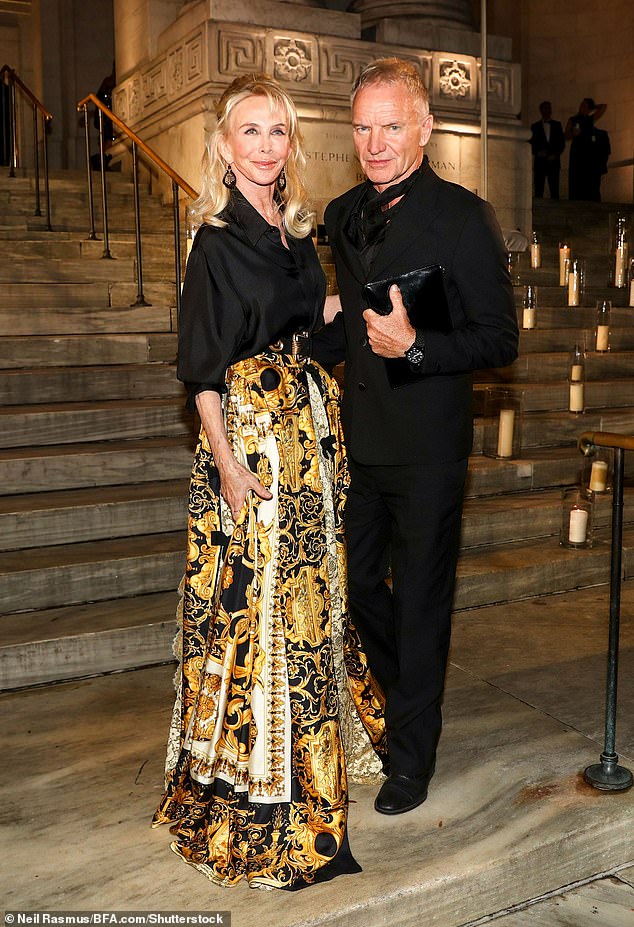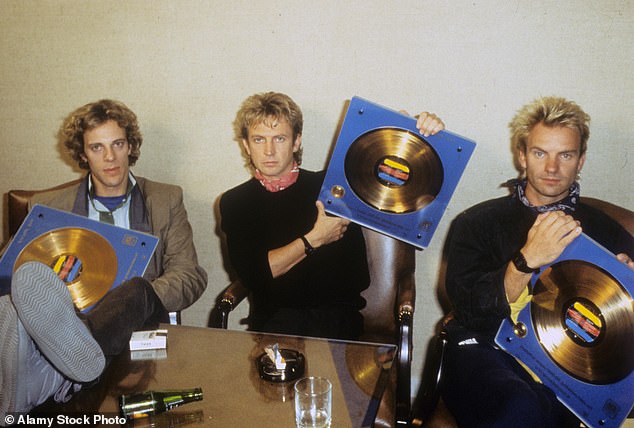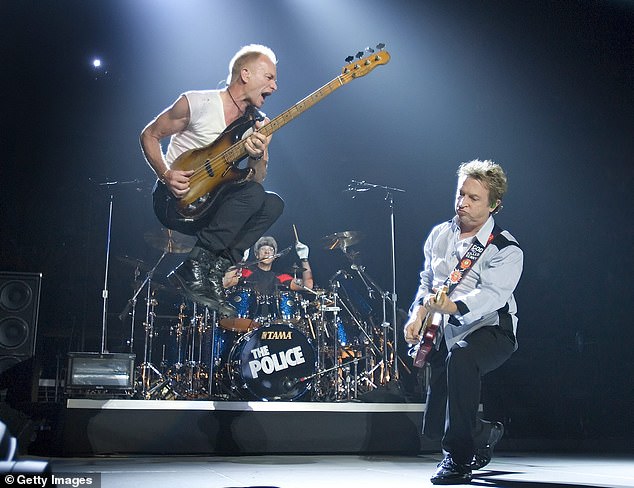It has been more than a decade since Sting warned his children against expecting a vast inheritance. ‘I told them there won’t be much money left because we are spending it,’ he said in 2014, referring to the lavish lifestyle he shares with second wife Trudie Styler. ‘We have a lot of commitments. What comes in, we spend – and there isn’t a lot left.’
Fast-forward to August 2025 and, depending on the twists and turns of the legal system, there may now be even less of the 73-year-old superstar’s fortune to share out among his six offspring.
In an unexpected development, his former bandmates in The Police are suing him for millions of pounds amid a lengthy dispute over unpaid royalties.
Guitarist Andy Summers, 82, and American-born drummer Stewart Copeland, 73, have lodged a High Court claim for ‘substantial’ damages following years of bitter rows, with a source telling one newspaper: ‘This has been coming for quite some time. Lawyers tried repeatedly to reach an out-of-court settlement but hit a stalemate.
‘Andy and Stewart decided there was no alternative than court, so pressed the button. They say they are owed millions in lost royalties.’
It is the latest chapter in an extraordinary saga of riches and rancour that has seen more than 75million record sales over a timespan of almost 50 years.
The Police were formed in London in 1977 and, by the end of the decade, had notched up two No 1 singles and the first of four consecutive chart-topping albums.

Trudie Styler with Sting at a gala last year in New York. The glamorous couple have famously said their children will not get a sizeable inheritance
With their brand of reggae-tinged rock also winning legions of fans across the Atlantic, it’s little surprise that the US music bible Rolling Stone described them as ‘possibly the biggest band in the world’ in 1983. Yet when they split the following year, it was in some respects surprising that they had managed to stay together for so long.
Despite meeting when they were all working as session musicians in the mid-1970s, The Police were an unlikely bunch from hugely disparate backgrounds. Nor by any stretch of the imagination could they be described as best friends.
A milkman’s son, Sting – real name Gordon Sumner – grew up on Tyneside and worked as a labourer and bus conductor before qualifying as a teacher. He later played bass guitar in jazz bands around Newcastle before moving to London.
Copeland, in contrast, was born into a well-to-do family in the US state of Virginia, although much of his early childhood was spent in the Middle East where his father, Miles Copeland Jr – later a founding member of the CIA – was posted as an intelligence officer. The young Stewart later attended the American School in London and was a boarder at Millfield, a public school in Somerset nicknamed ‘the Double Cream school’ on the basis it was for ‘the thick and rich’.

Left to right, Copeland, Summers and Sting hold up gold discs from their 1983 hit Every Breath You Take

The Police on stage. Even Sting admitted he tried to run the band as a ‘benign dictatorship’
Almost a decade older than his bandmates, Summers had been a respected figure on the music scene since the 60s. He said in an interview three years ago he realised during an early Police tour he was in a band with ‘two total a***holes’.
Even Sting admitted he tried to run The Police as a ‘benign dictatorship’. Shortly before the group broke up he told an interviewer: ‘It’s not an easy relationship by any means. We’re three highly autonomous individuals and a band is an artificial alliance most of the time.
‘There are obviously tensions but I think there’s a great love between us and a genuine respect. I can’t think of two musicians I’d rather play with. But none of us is easy to work with. It’s not all buddy-buddy and never was.’
Asked how the three of them arrived at decisions, he remarked: ‘Violence… I’ll argue ‘til the cows come home about something I believe in, and so will Andy and Stewart.’
For his part, Copeland admitted cracking one of the frontman’s ribs during a mock-fight when they were on tour in America: ‘It was done in jest, even though, yes, my knee was applied to his ribcage. We were like siblings, so of course the arguments were heated.’
More pointedly, the drummer once said, Sting ‘not only hates humanity, but every human within the species apart from his own family and has an ego so large it is visible from the moon’.
He also set up his cymbals onstage during the band’s final tour so that he couldn’t see the singer, as well as reportedly having the handwritten slogan ‘Sting. Is. A. C***.’ on his tom-tom drums.
Against that backdrop, it seems entirely natural the trio had little to do with each other in the years following their break-up. It is even less surprising that Sting and Copeland underwent joint therapy sessions before The Police got back together for a reunion tour that started in May 2007 in Vancouver and ended 15 months later in New York’s Madison Square Garden.
Yet the $360million (£265million) revenue from 3.7million ticket sales was no doubt incentive enough for the warring parties to put their differences aside – especially given their well-documented fondness for the folding stuff.
Journalist and author Allan Jones, who accompanied the band on tour across Asia when they were at their peak, recalled: ‘It was like being on the road with a branch of the NatWest, all they spoke about was money and how much money they were going to make out of this tour.
‘Copeland would look out at India and say: “There must be a market for t-shirts in this sub-continent”.
‘Every discussion was about money, how much they were earning, how much it was costing them to get from one place to another, could they do it cheaper.’
It was, said Jones, ‘very wearing’. Speaking in 2022, Summers said the reunion tour – which involved 151 shows – was ‘a giant pay-off for all of us and quite incredible: the most money I’ve ever made’.
But just not quite enough, apparently. The writ issued on behalf of Summers and Copeland is listed at the High Court under ‘general commercial contracts and arrangements’. Both Sting and his company, Magnetic Publishing Limited, are listed as defendants.
Although it is unclear which songs are at the centre of the legal action, it is widely thought that both Summers and Copeland made significant musical contributions to The Police’s best-known hit Every Breath You Take – which topped the Billboard Hot 100 in 1983 and was one of the best-selling singles of the decade. Summers has previously remarked that the song was ‘going in the trash until I played guitar on it’.
Sting, who is credited as the song’s sole songwriter, is believed to receive more than £500,000 a year in royalties from the track – although his spokesman denied to The Sun that it is linked to the legal case.
Meanwhile Copeland was asked in an interview last year if he knew the lyrics of any of The Police songs he played on. ‘I do now,’ he replied before admitting that he ‘never listened to them in the day’ because he was ‘just banging s*** in the background’ on drums.
For his part, Sting continues to enjoy the sort of existence that an estimated $550million (£405million) personal fortune can readily buy. His main home is a Grade I-listed manor house in rural Wiltshire, while he also has a 16th century villa in Tuscany. His property portfolio has also featured a New York townhouse overlooking Central Park.
Other indulgences down through the years have included an art collection boasting pieces by Matisse and Picasso. But if he ends up having to pay out millions to his former bandmates, spending so freely might end up being a source of regret. And not just for Sting himself, but for his children too.











